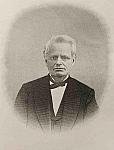Why was the Grand Rapids Furniture Industry Successful?
by William Widdicomb
Why was the furniture business so successfully established in Grand Rapids? What peculiar condition or circumstance has given this town its prominent position?
WAS IT LOCATION?
We had no natural advantages originally. Lumber was abundant, but it was equally abundant anywhere and everywhere in the Northern country. Waterpower was a free as the lumber, yet waterpower was to be found also all over the Northern States. Not only did we have no special natural advantages, but we were placed at an exceedingly inconvenient location for manufacturing furniture, with but one railroad and that terminating at the Lake upon one side and Detroit upon the other, with no connections whatever to other portions of the United State; the river and lake our only practicable method of transportation to the then growing West.
WAS IT TRANSPORTATION?
When, eventually, we did have a connecting railroad with the Michigan Central and Lake Shore & Michigan Southern our whole product was freighted through towns where many well-established competitors were located. Upon the Michigan Central were Buchanan and New Buffalo, both manufacturing upon a larger scale than ourselves. Upon the Lake Shore were to be found La Porte, Mishawaka and South Bend, each having one or more successful furniture factories. Chicago was the distributing point, and there were, as at present, other and stronger competitors, yet the city of Grand Rapids rapidly passed all of them.
WAS IT COMPETITION?
During these same days Boston was the Eastern manufacturing point for all fine chamber furniture, and Cincinnati was equally prominent. Several large and eminently successful concerns were in operation in both cities, which eventually passed out of existence. The Boston people maintaining that this was due to the ruinous competition of Grand Rapids and one or two other Western towns—competition they could not meet; yet they had all the advantage in prior possession of the field, abundant capital, fine factories, and a near location to the market. In the face of all this Grand Rapids steadily developed, both in the character of its product and the magnitude of its works.
WAS IT THE PEOPLE?
It is one of my theories that it is not so much location or natural advantage that secures exceptional business success, but rather the personality of the men who happen to originate and develop it, and to this very feature do I ascribe the importance which Grand Rapids achieved in furniture manufacturing. Fortunately for Grand Rapids, its pioneer furniture manufacturers were the happy possessors of those important characteristics required for success in their own industry, and among them no one man displayed such pre-eminence in energy, industry, originality and business prudence—all the factors that are demanded for our business—as Julius Berkey. Mr. Berkey had all of these to a marked degree, and I doubt whether he knew the meaning of the word “discouragement.”
George W. Gay was equally capable. While Mr. Gay may have had at first but indifferent technical knowledge in manufacturing, he did possess the talents that make men prominent among their fellows. He had shown energy and earnest zeal in business affairs up to the time he entered the Berkey & Gay Company, and the years immediately following Mr. Gay’s entry were epoch making for the industry, which was to render Grand Rapids so famous. Within a short time, from 1866 to 1873, Berkey Brothers & Gay developed into an institution of such magnitude as to warrant capitalization at a very large figure. When I glance back over those days—days that cover the early struggles of our industry—I cannot refrain from amazement that such work could be accomplished so rapidly. I see them occupying the original factory on the canal, then occupying the upper floors of the buildings now used by Gardner & Baxter; from there to several buildings on Canal Street opposite Bronson, receiving first premium at the State Fair, opening a branch in New York City, taking a high position in the Eastern trade, and all this prior to 1875.
Mr. Berkey possessed the instincts of the manufacturer to a marked degree, and Mr. Gay gave evidence of equally keen insight into the mercantile portion of the business while rapidly acquiring skill and exceptional judgment in the artistic designs for which they were widely known. They also had that quality of human nature that enabled them to employ men successfully, securing their good will, their earnest co-operation; in fact, they were indefatigable in their attention to all the details of the business; nothing too large to grasp, nothing so small but it received attention. For those early stages both Mr. Berkey and Mr. Gay developed exceptional originality and enterprise. They were the first to introduce expensive improvements in machinery, the first to display originality in design, the first to employ skilled designers, and the first to bring skilled mechanics from other section of our country, and even from foreign lands. Not difficulty ever deterred them when they had once decided their business required improvement and skill beyond which our own workmen could furnish. Their ability and progress were a stimulus to every other manufacturing concern in Grand Rapids; their competition of that straightforward business character every fair-minded man is willing to meet. I give special credit to that firm for our development in those early days. Very soon equally capable men appeared, organizing and conducting other concerns, which added to the strength and individuality of our business and our progress was steadily promoted until the position of Grand Rapids before the United States was assured.
Excerpted from, The Early History of the Furniture Industry in Grand Rapids, by William Widdicomb. Grand Rapids Historical Society. 1909. Grand Rapids Public Library, Coll #141-20-3

 facebook
facebook








